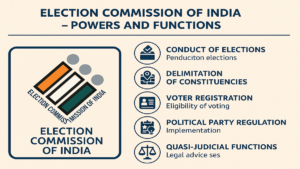India has taken a significant step towards addressing the challenges posed by climate change by joining the United Nations’ ‘Race to Resilience‘ global campaign. This decision, announced during the recently concluded COP28 event in Dubai, reflects India’s commitment to building climate resilience in its urban areas.
Background: ‘Race to Resilience’
- The ‘Race to Resilience’ is a worldwide platform that aims to unite non-state actors, investors, businesses, cities, regions, and civil society. The goal is to enhance the resilience of the most vulnerable communities to the impacts of climate change by 2030.
- Established in 2020, this campaign serves as a collaborative space to develop and implement strategies that mitigate climate-related risks and build resilient urban environments.
NIUA’s Role: C-Cube and ClimateSmart Cities Assessment Framework (CSCAF)
- The Climate Centre for Cities (C-Cube) at NIUA, an autonomous institution under the Ministry of Housing and Urban Affairs, will play a pivotal role in spearheading India’s participation in the ‘Race to Resilience.’
- C-Cube has been actively involved in the development and implementation of the ClimateSmart Cities Assessment Framework (CSCAF). This framework serves as a groundbreaking city assessment tool, focusing on climate-relevant parameters specific to Indian cities.
- Currently, C-Cube is in the midst of the third round of assessments for 220 cities across India under the CSCAF framework. The assessments cover a wide range of topics, including urban planning, green cover, biodiversity, energy efficiency, green buildings, mobility, air quality, water management, and waste management.
Key Initiatives: ClimateSmart Cities Assessment Framework Modules
Under the CSCAF framework, C-Cube has successfully developed and delivered 26 training modules. These modules are designed to enhance various aspects of urban planning and development, with a specific focus on sustainability and resilience. The training covers key areas such as:
1.Urban Planning and Design: Strategies to align urban growth with reduced greenhouse gas (GHG) emissions intensity.
2.Green Cover and Biodiversity: Measures to promote and enhance green spaces within urban areas.
3.Energy and Green Buildings: Guidelines for energy-efficient building practices and sustainable infrastructure.
4.Mobility and Air Quality: Initiatives to improve transportation systems and address air quality challenges.
5.Water Management: Sustainable approaches for efficient water use and management within cities.
6.Waste Management: Strategies to promote effective waste disposal and recycling methods.
Vision for Urban India
- The rapid urbanization of India is a critical factor. It is estimated that by 2030, 40% of India’s population will reside in urban areas.
- Debolina Kundu, the Director of NIUA emphasizes the importance of aligning urban growth with a reduction in GHG emissions and strengthening the capacity of cities to rebound effectively from climate-related extreme events and disaster risks.
Strategic Partnership for Sustainable Development
By fostering sustainable development, building resilience, and enabling cities to withstand environmental, social, and economic shocks, India aims to contribute significantly to the global effort in combating climate change.
Important Questions Related to Exams
Q. Which institution is spearheading India’s participation in the ‘Race to Resilience’?
Answer: The Climate Centre for Cities (C-Cube) at the National Institute of Urban Affairs (NIUA) is spearheading India’s participation in the ‘Race to Resilience.’
Q. What is the estimated percentage of India’s population residing in urban areas by 2030?
Answer: It is estimated that 40% of India’s population will be residing in urban areas by 2030.
Q. What specific areas does the CSCAF framework address in its assessments for Indian cities?
Answer: The CSCAF framework addresses a wide range of topics, including urban planning, green cover, biodiversity, energy and green buildings, mobility and air quality, water management, and waste management.










 Russia Opens 1 Million Job Slots for Ind...
Russia Opens 1 Million Job Slots for Ind...
 Centre Forms Committees to Honour Patel,...
Centre Forms Committees to Honour Patel,...
 Election Commission of India – Powers an...
Election Commission of India – Powers an...

